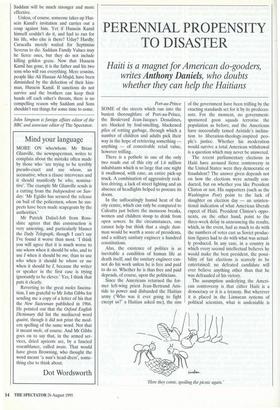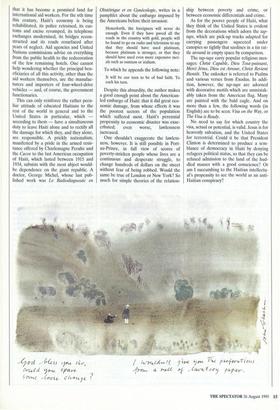PERENNIAL PROPENSITY TO DISASTER
Haiti is a magnet for American do-gooders,
writes Anthony Daniels, who doubts
whether they can help the Haitians
Port-au-Prince SOME of the streets which run into the busiest thoroughfare of Port-au-Prince, the Boulevard Jean-Jacques Dessalines, are blocked by foul-smelling, blackened piles of rotting garbage, through which a number of children and adults pick their way in the hope of retrieving something — anything — of conceivable retail value, however trifling.
There is a pothole in one of the only two roads out of this city of 1.6 million inhabitants which is so large that one night it swallowed, with ease, an entire pick-up truck. A combination of aggressively reck- less driving, a lack of street lighting and an absence of headlights helped to procure its doom.
In the suffocatingly humid heat of the city centre, which can only be compared to Calcutta just before the monsoon breaks, women and children stoop to drink from open sewers. In the circumstances, one cannot help but think that a single dust- man would be worth a score of presidents, and a solitary sanitary engineer a hundred constitutions.
Alas, the existence of politics is as inevitable a condition of human life as death itself; and the sanitary engineer can- not do hi S work unless he is free and paid to do so. Whether he is thus free and paid depends, of course, upon the politicians.
Since the Americans returned the for- mer left-wing priest Jean-Bertrand Aris- tide to power and disbanded the Haitian army (Who was it ever going to fight except us?' a Haitian asked me), the sins of the government have been trifling by the exacting standards set for it by its predeces- sors. For the moment, no government- sponsored goon squads terrorise the population as before; and the Americans have successfully tamed Aristide's inclina- tion to liberation-theology-inspired peo- ple's justice. Whether his moderation would survive a total American withdrawal is a question which may never be answered.
The recent parliamentary elections in Haiti have aroused fierce controversy in the United States: were they democratic or fraudulent? The answer given depends not on how the elections were actually con- ducted, but on whether you like President Clinton or not. His supporters (such as the Washington Post) point to the lack of slaughter on election day — an uninten- tional indication of what American liberals expect of Haiti. President Clinton's oppo- nents, on the other hand, point to the three-week delay in announcing the results, which, in the event, had as much to do with the numbers of votes cast as Soviet produc- tion figures had to do with what was actual- ly produced. In any case, in a country in which every second intellectual believes he would make the best president, the possi- bility of fair elections is scarcely to be entertained: no defeated candidate will ever believe anything other than that he was defrauded of his victory.
The assumption underlying the Ameri- can controversy is that either Haiti is a democracy or it is a tyranny. But wherever it is placed in the Linnaean systems of political scientists, what is undeniable is 'Here they come, spoiling the picnic again.' that it has become a promised land for international aid workers. For the nth time this century, Haiti's economy is being rehabilitated, its police retrained, its cus- toms and excise revamped, its telephone exchanges modernised, its bridges recon- structed and its roads resurfaced after years of neglect. Aid agencies and United Nations commissions advise on everything from the public health to the redecoration of the few remaining hotels. One cannot help wondering whether the principal ben- eficiaries of all this activity, other than the aid workers themselves, are the manufac- turers and importers of four-wheel-drive vehicles — and, of course, the government functionaries.
This can only reinforce the rather pecu- liar attitude of educated Haitians to the rest of the world in general and to the United States in particular, which — according to them — have a simultaneous duty to leave Haiti alone and to rectify all the damage for which they, and they alone, are responsible. A prickly nationalism, manifested by a pride in the armed resis- tance offered by Charlemagne Peralte and the Cacos to the last American occupation of Haiti, which lasted between 1915 and 1934, subsists with the most abject would- be dependence on the giant republic. A doctor, George Michel, whose last pub- lished work was Le Radiodiagnostic en Obstetrique et en Gynecologie, writes in a pamphlet about the embargo imposed by the Americans before their invasion:
Henceforth, the foreigners will never do enough. Even if they have paved all the roads in the country with gold, people will be found to go on radio and television to say that they should have used platinum, because platinum is stronger, or that they should have used even more expensive met- als such as osmium or iridium.
To which he appends the following note:
It will be our turn to be of bad faith. To each his turn.
Despite this absurdity, the author makes a good enough point about the American- led embargo of Haiti: that it did great eco- nomic damage, from whose effects it was the poorest sectors of the population which suffered most. Haiti's perennial propensity to economic disaster was exac- erbated; even worse, lawlessness increased.
One shouldn't exaggerate the lawless- ness, however. It is still possible in Port- au-Prince, in full view of scores of poverty-stricken people whose lives are a continuous and desperate struggle, to change hundreds of dollars on the street without fear of being robbed. Would the same be true of London or New York? So much for simple theories of the relation- ship between poverty and crime, or between economic differentials and crime.
As for the poorer people of Haiti, what they think of the United States is evident from the decorations which adorn the tap- taps, which are pick-up trucks adapted for carrying passengers squeezed under canopies so tightly that sardines in a tin rat- tle around in empty space by comparison.
The tap-taps carry popular religious mes- sages: Christ Capable, Dieu Tout-puissant, Merci Jesus, Dieu est Amour, Christ Revient Bient6t. The onlooker is referred to Psalms and various verses from Exodus. In addi- tion, however, the tap-taps are adorned with decorative motifs which are unmistak- ably taken from the American flag. Many are painted with the bald eagle. And on more than a few, the following words (in English) are to be seen: Visa on the Way, or The Visa is Ready.
No need to say for which country the visa, actual or potential, is valid. Jesus is for heavenly salvation, and the United States for terrestrial. Could it be that President Clinton is determined to produce a sem- blance of democracy in Haiti by denying refugees political status, so that they can be refused admission to the land of the hud- dled masses with a good conscience? Or am I succumbing to the Haitian intellectu- al's propensity to see the world as an anti- Haitian conspiracy?



















































 Previous page
Previous page